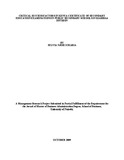| dc.description.abstract | Few studies in Kenya have examined the identification and application of critical success factors
(CSFs) to various areas of operation in Kenya. The primary purpose of this study was to
determine the critical success factors that count for good performance in KCSE by public
secondary schools in Kiambaa division. A secondary purpose was to determine whether public
secondary schools in Kiambaa division based their success strategies on the critical success
factors. The study was informed by the theory on the CSFs approach to management as well as
the many studies that have been conducted to determine the major school related factors that
influence learner achievement.
Data was obtained by means of a census survey. The respondents were principals, deputy
principals and heads of departments in all the 19 public schools in Kiambaa Division. Self
administered questionnaires were circulated to all the selected respondents and the response rate
was 79% (120/152). To answer the research questions, the data was analyzed using descriptive
statistics i.e. measures of central tendency and measures of dispersion.
The study found that there were eight critical success factors that count for good performance in
Kenya Certificate of Secondary Education examinations in public secondary schools in Kiambaa
division. These were high standards of discipline by students; commitment and dedication to the
job; proper time management in school; collaborative and supportive leadership style; high
standards of discipline by staff; text books; training students on study skills; laboratory
equipment and chemicals. The study also found that the success strategies given high priority in
schools were only somewhat based on the critical success factors. Critical success factor areas
were not adequately addressed because schools primarily focused on four of these CSFs i.e.
provision of adequate text books, high standards of discipline by students, provision of
laboratory chemicals and equipment and high standards of discipline by staff . Schools did not
pay exceptionally high and continuous attention to proper time management, collaborative and
supportive leadership and training students on study skills.
Recommendations for practice include suggestions that education policy makers review their
policies on education management to ensure that they reflect the Critical Success Factors, ensure
vi
explicit communication of these factors to all appropriate levels of management in a structured
manner and design mechanisms to monitor and evaluate how adequately these CSF areas are
being addressed in schools. Student discipline being most critical to success should be given very
serious and continuous attention by schools administrators who should come up with creative
approaches to create or enhance a school culture that embraces self- discipline at its core. School
administrators should re-evaluating their strategic priorities and agenda in light of the findings on
CSFs and where necessary, rework their strategic plans accordingly. | en |

